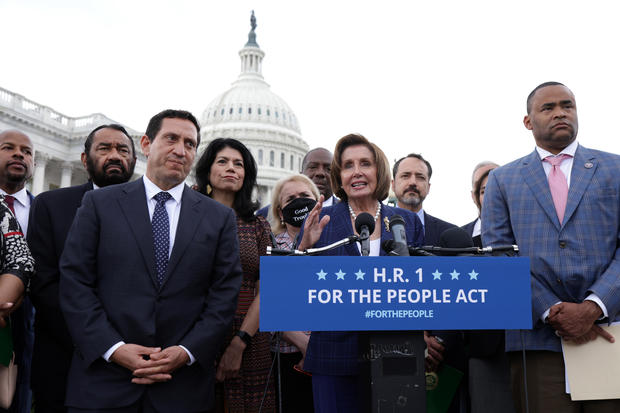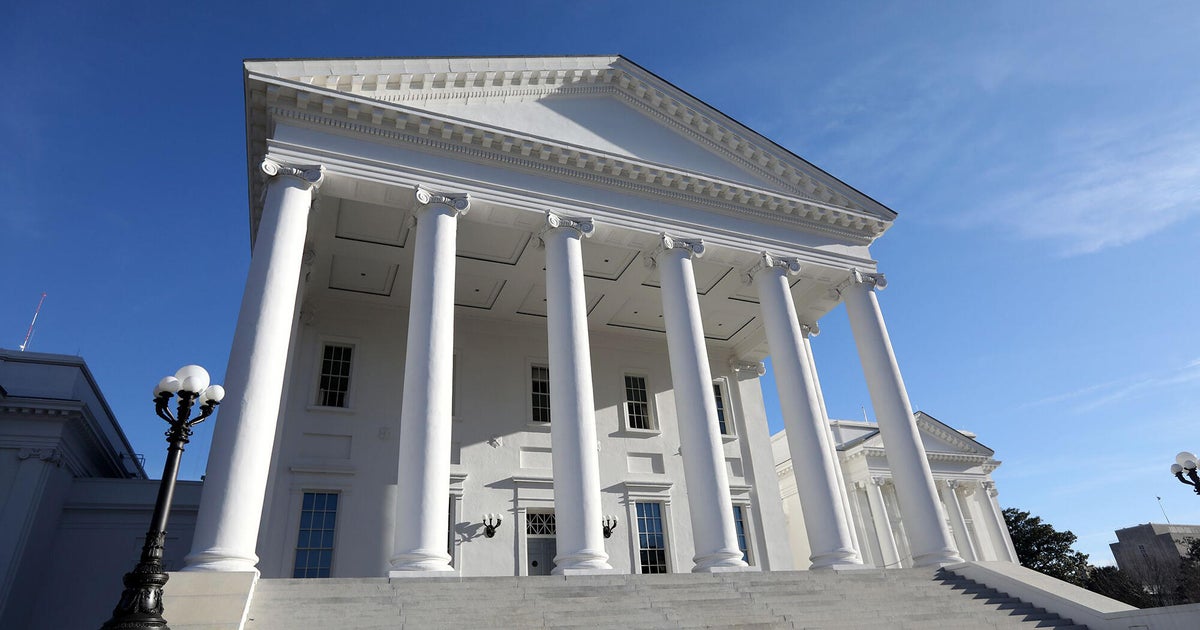Texas Democrats who staged walkout pressure U.S. Senate to pass voting bills
A group of Democratic state lawmakers from Texas on Tuesday pressured U.S. senators to pass two major voting bills that have been stalled.
The Texas Democrats who traveled to Washington this week were part of a group of lawmakers who staged a walkout in the closing hours of the state's legislative session last month to defeat a sweeping election bill Republicans in the state were trying to pass. They met Tuesday with Congressional Democrats, including Senate Majority Leader Chuck Schumer, House Speaker Nancy Pelosi and spoke at the Senate Democrats' lunch.
"These Texas Democrats bravely fought against voter suppression," Schumer said. "They must have gotten five or six standing ovations. We were really taken by their courage, their bravery and, most importantly, their mission."
The Texas Democrats are urging their counterparts in the Senate to pass the For The People Act, a sweeping election reform bill passed by the House earlier this year. The bill would require states to overhaul voter registration systems, expand access to early and mail voting, revise campaign finance laws and reform the redistricting process. The lawmakers are also asking Congress to eventually pass the John Lewis Voting Rights Advancement Act, which would restore a key provision of the Voting Rights Act that required certain jurisdictions with a history of racial discrimination to receive pre-clearance before changing voting rules.
"We came here because the future of Texas voting depends on action from Congress," Texas state Representative Nicole Collier told reporters. "We need federal intervention. The For the People Act will be a great compliment, and start, to stopping this assault on our rights."
The Texas lawmakers argue that the For the People Act is necessary to block Republican efforts to rewrite the voting laws in the Lone Star State. While Democrats blocked a major voting bill at the end of May, Governor Greg Abbott has pledged to call a special session to take up election reform.
The Texas bill that was defeated last month would have set limits on early voting hours, banned drive-through voting, added new requirements for mail voting and made it a felony for public officials to send unsolicited absentee ballot applications. Republicans have said the bill is necessary to support election integrity, despite no evidence of widespread fraud in Texas' election.
The focus for Democrats centers on Joe Manchin of West Virginia, who said last week that he does not support the For The People Act. Manchin did not attend Tuesday's lunch with Senate Democrats, but some of the Texas lawmakers met with Manchin's staff.
"I left there with hope and inspiration and with an invitation to come back and meet once again," Texas state Representative Trey Martinez Fischer told reporters. "One thing was very clear from that meeting with Senator Manchin's office: voting practices in West Virginia are way different than voting practices in Texas."
Manchin and Senator Kyrsten Sinema of Arizona, who also did not attend Tuesday's Democratic lunch, are opposed to eliminating the filibuster, which would allow bills to pass the Senate with 51 votes. Democrats currently have 50 seats in the Senate and Vice President Kamala Harris can cast any tie-breaking vote.
Senate Minority Leader Mitch McConnell said again on Tuesday that there won't be any Republicans who support the For the People Act, meaning Democrats will need every single vote.
"Think of this as exactly what it is: a partisan effort by the majority to take over at the federal level how we conduct all American elections," McConnell said Tuesday. "The core desire they have is to federalize all elections and try to achieve a benefit for the Democrats at the expense of the Republicans."
The Texas lawmakers are scheduled to meet with Harris on Wednesday. President Biden recently tapped Harris to lead the administration's effort on voting rights. She told reporters on Tuesday that Mr. Biden is ready to sign into law both the For the People Act and the John Lewis Voting Rights Act.




